A Male Face as the Future of Burma’s Democracy? Women Say No
By Nicha Wachpanich and Raslaphas Kaweewat
MARCH 8th, 2023 // Amid their struggle for democracy, Burmese women say NO to all-male policy dialogues that risk perpetuating patriarchy in the future society.
The struggle for democracy in Myanmar looks similar to the ‘Hunger Games’ Hollywood-movies trilogy. In the aftermath of the coup d’Etat on February 1st, 2021, people from Burma rose against the military junta’s seizure of power. They massively used the iconic three-fingers salute of resistance against authoritarianism and united around the figure of their female elected leader. The pictures of Mockingjay overlapped with the faces of Aung San Suu Kyi.
Aung San Suu Kyi, the daughter of independence leader and founder of the national army General Aung San (1915-1947), has been the face of political liberalization in Myanmar for many years. Despite international criticism caused by her controversial stance towards the Rohingya ethnic group, she and her political party have retained great support in the 2020 election and remained the face of hope many pro-democracy movements hold on today against the coup d’Etat.
But even so, discussion and implementation of Myanmar development are mostly dominated by men. “Manels – All Male Panels of Burma” is a recent exhibition held in Landin cafe, Chiang Mai, Thailand in March 2023. It reveals that at least 158 panels with only male speakers discussing the future of the country have been organized in the past two years since the coup.
“Women contribute to more than half of the population in Myanmar,” pointed out Yinglao NoanVo, one of the curators of the exhibition. “But it has always been mostly men who talk about politics, economy, development and democracy.”
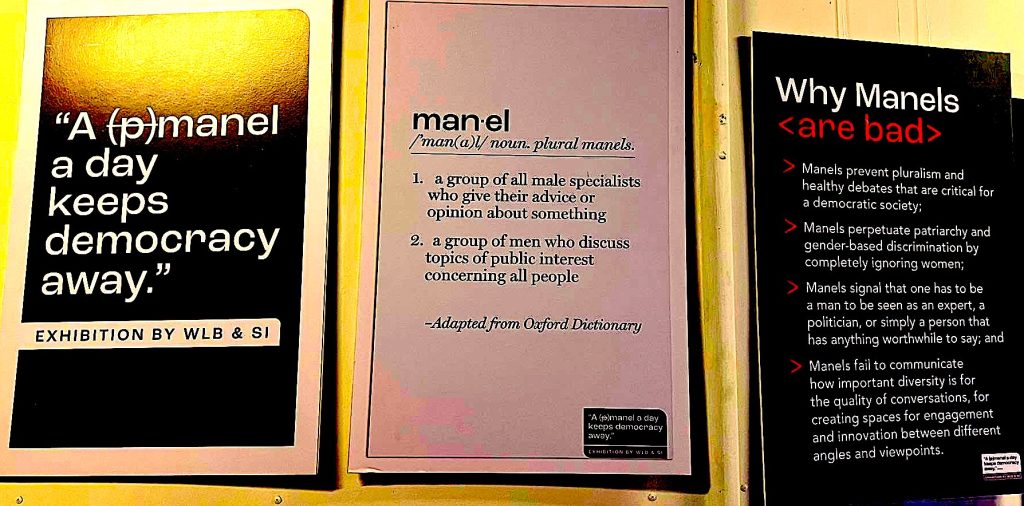
On March 8th, 2023, Women’s League of Burma (WLB), an umbrella for twelve ethnic women organizations, took part in an International Women Day rally in the streets of Chiang Mai. They also set up an exhibition with the satirical title “Manels: All Male Panels of Burma”. Manels – a word play of ‘Male’ and ‘Panel’ is not new to the feminist movement, but it was the first time in history that it was used in the Myanmar context.
From just a curious observation, the team began in late 2020 to systematically document the phenomenon – collecting posters of online webinars for two and a half years. There were many political debates during the pre-election and after the coup that overthrew the latest national election in Myanmar held in November 2020.
The collection has revealed a shocking high number of 158 manels with 364 male panelists in 28 months, an average of 5 manels per month.
The organizers of the panels range from major news organizations to local media: ranking at the top are Radio Free Asia, followed by Trends in Myanmar, a popular political talk show by an Oxford graduate and former politician, as well as the well-trusted TV broadcast Democratic Voice of Burma (DVB). Many of the male panelists are high-profile scholars, businessmen and activists from diverse sectors.
“When we point out that this is a problem, people don’t believe you, saying it is just a coincidence, so here are the proofs,” explained the 38-years old Shan woman. “If you are not capable of finding a woman to join the conversation, how can you liberate the country?”
‘A Manel a day keeps Democracy away’ – is the tagline of the exhibition and the core belief of the WLB which has been promoting the participation of women for more than twenty years in the struggle for democracy and the reconciliation process to solve Myanmar’s numerous internal conflicts.
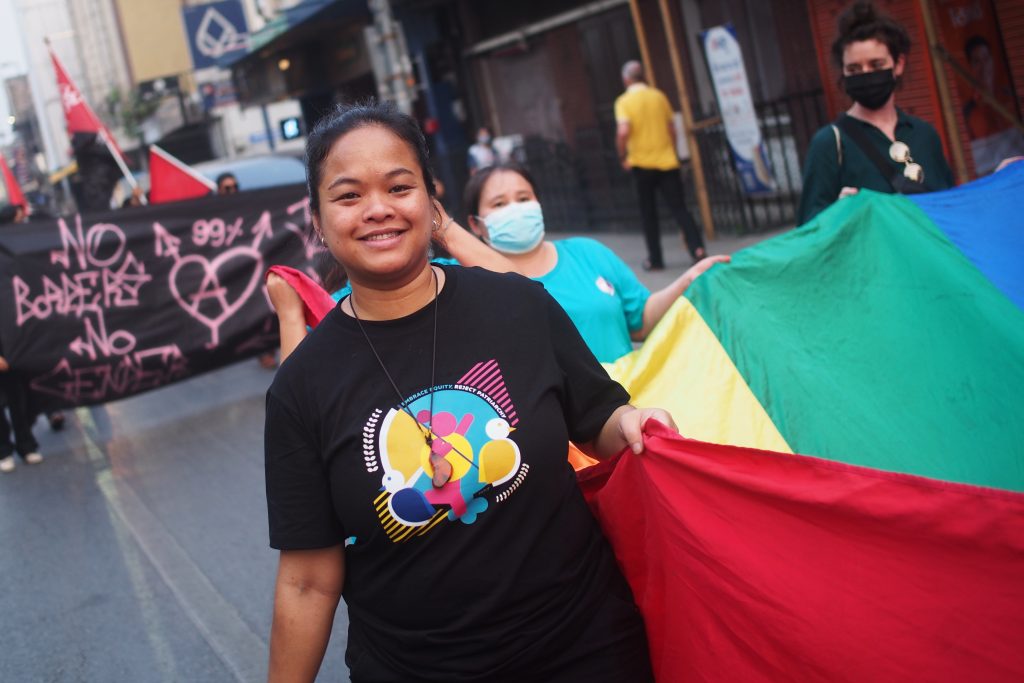
But speaking up about this is not easy because it also means speaking up against their male peers who work hard in promoting democracy too. After the recent coup, Chiang Mai, a major town in the north of Thailand, has become the new hub for Burmese diaspora communities. A Burmese man visited the exhibition and eyed throughout the collections of manels. Then he threatened to take legal action against the Women Network for defamation if his name was on the list.
Despite sharing the same goal in ending the cycle of military rule, women activists often faced opposition from their male colleagues and even from some fellow women who think that the current revolutionary movement in Myanmar should focus first of all on overthrowing the dictatorship, instead of the patriarchy.
Yinglao has a different view: “Patriarchy is a kind of dictatorship, so we have to fight this too. We can’t just wait in line to bring back a so-called democratic society first before we empower women.”
“If you see this exhibition and you feel offended, you should feel offended. Because I, as a woman, feel offended in the patriarchal society all the time.”
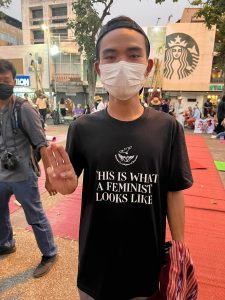
Some said that pro-democracy actions that caught international attention for their creativity like the Htamein (Sarong) protest might be double-edged. In March 2021, women hung their traditional clothes over the streets to spook superstitious officers. The “cloth barricade” played with the Hpone, a traditional Burmese belief that it is bad luck for men to walk beneath women’s clothing. But this power game might also perpetuate this misogynistic belief in the Burmese culture according to Yinglao.
This mindset is being slowly deconstructed, especially in the new generations. Saw Victory, a 24 -year-old Karen man, wrapped his hair with a Htamein to march along the WLB on the streets of Chiang Mai during International Women’s Day. He is member of a Karen development youth movement. Together, they rallied with pride, presenting the WLB flags made of Htamein – 12 different patterns representing the 12 ethnic groups united in the League.
“First, I used to believe that it was bad luck too. But working with women, I came to understand that it’s just a cloth,” stated Saw Victory.
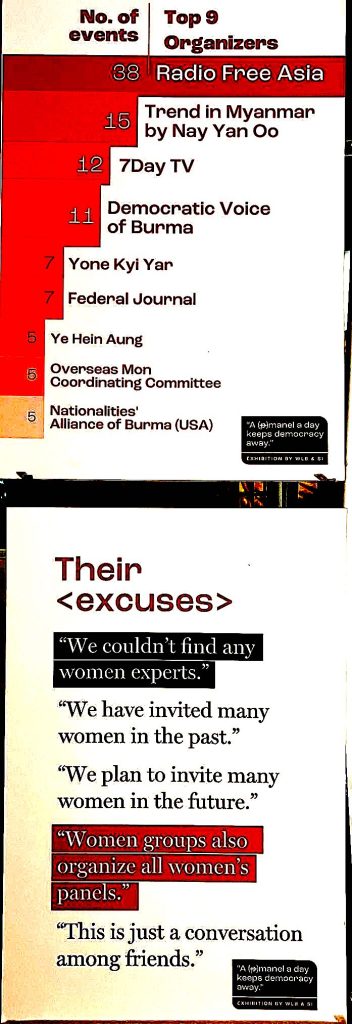
The Manel exhibition was welcomed by some men too. The WLB observes that more and more male colleagues become gender sensitive, raising concerns when the panel discussions they organize don’t include women representatives or refusing to attend all male panels they are invited to.
The Institute for Strategy and Policy – Myanmar (ISP – Myanmar) has put together a name list of 674 women from 14 regions across Myanmar. These female experts work on politics, economy, land and environmental rights, security and social issues. The namelist aims to help the panel organizers to find their speakers and debunk the myth that Burmese women don’t have adequate knowledge and expertise compared to their male peers.
Actually, more Burmese women than Burmese men are formally educated, according to a UNESCO survey; 34.2% of women finish high school, women make up 65.2% of pre-bachelor degree students, 80.5% of master degree students, and 80.8% of PhD students. The low women’s participation in decision-making due to perceived lower skills result solely from a social structure that does not welcome women’s input. Despite a statement to respect gender equality, Myanmar’s 2008 Constitution – that ensured military dominance and that pro-democracy Burmese people reject en masses since the coup – still does not prevent the “appointment of men to positions that are suitable for men only”.
Eliminating the challenges for Myanmar women to take the panel seats is also an important mission as the responsibility of house chores and child care often weigh on them. WLB provides support for child care to women attending their conferences, a trailblazing move many organizations around the world are taking. Many women have missed out the opportunity to participate in the policy making dialogues or capacity building workshops due to the fact that they have to take care of their family.
For Yinglao, documenting Manels is not only about making space for women, but also pointing at the lack of diversity in the development dialogues, which is an irony for a country with such pluralism in genders, ethnics, religions and generations. “When you host a panel, ask yourself if the panelists can provide a diverse perspective or not. Only male Bamar discussing the future of Myanmar is not okay.”
You can follow the updates of the Burma Manels Watch here.
You can browse through “Women out in the streets for a new Burma”, our past photo-exhibition in collaboration with the WLB
Read the Thai version of the article on Mirror Thailand.
Read the French version of the article on Mediapart
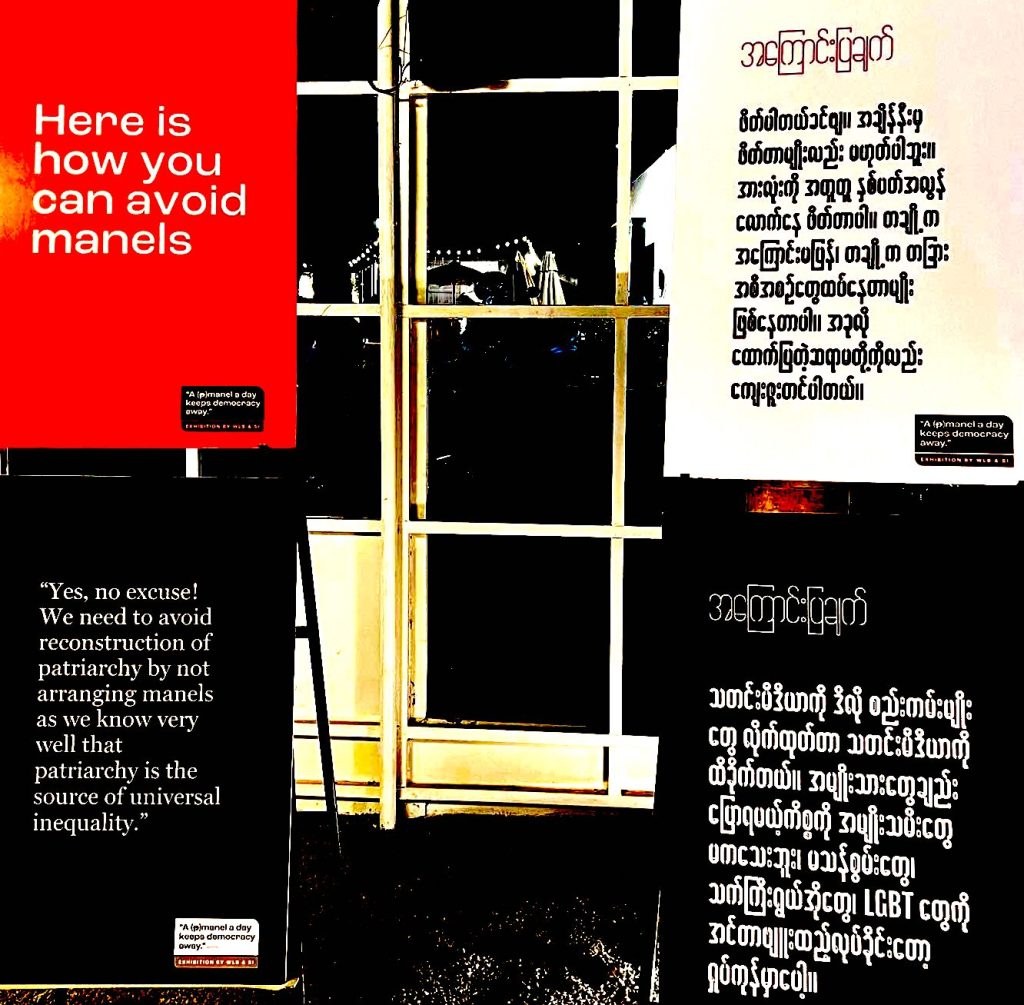
WATCH OUR NEW DOCUMENTARY
For International Women’s Rights Day 2024, Info Birmanie and Visual Rebellion Myanmar present a documentary about Burma’s Manel Watch fight for equality and representativity. The interviews were conducted during the second Manel Exhibition that was held at SEA-Junction, Bangkok on October 2023. The documentary touches on the lack of representation of female experts, including a focus on the doxxing and online threats against Burmese women activists.